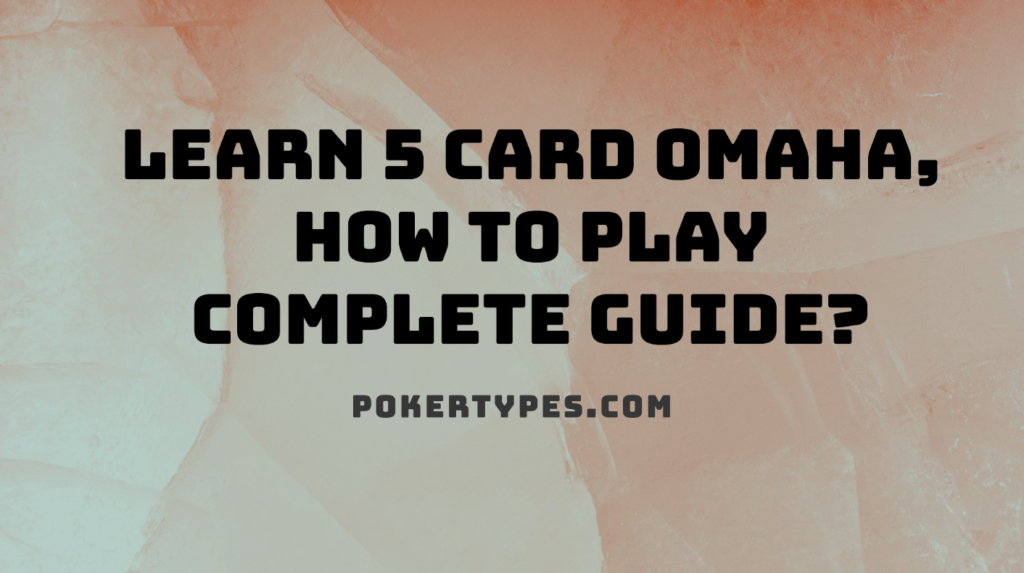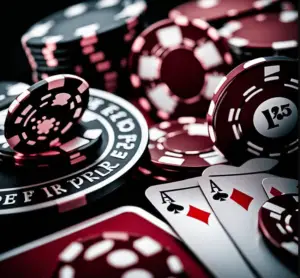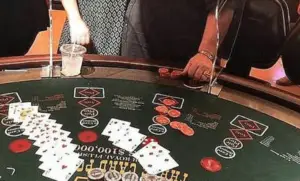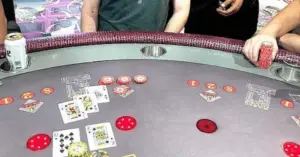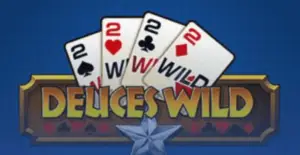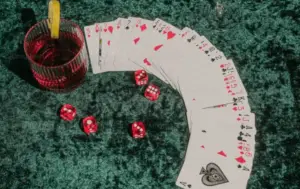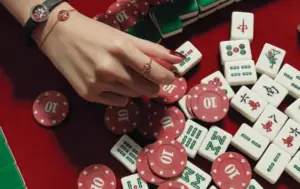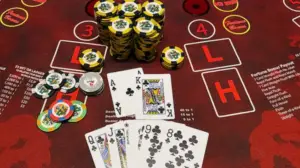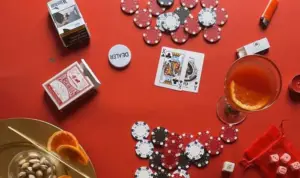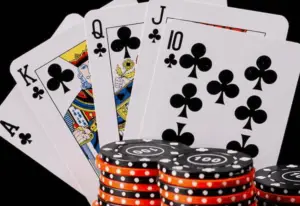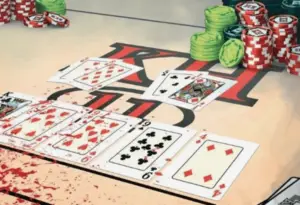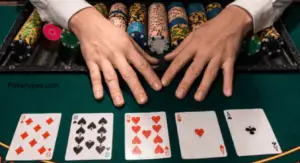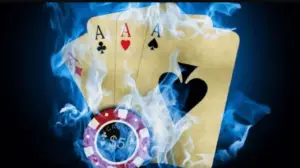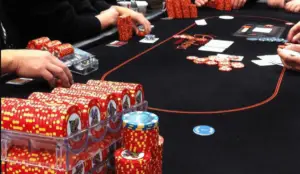5 Card Omaha is a variant of Omaha, which is the second most popular poker game in the world. It is becoming increasingly popular among card sharks.
It’s like Texas Hold’em on steroids, with players getting five-hole cards instead of just two. This twist cranks up the action and strategy to 11!
While 4 Card Omaha is already wild, 5 Card takes it to a whole new level. Players must use exactly two of their hole cards and three community cards to make the best hand. This leads to bigger pots and more dramatic showdowns.
According to PokerStars, 5 Card Omaha games make up about 15% of their Omaha traffic, showing its growing appeal.
The game is typically played with pot-limit betting, which keeps things spicy without going overboard. If you’re looking for a poker game that’ll keep you on your toes, 5 Card Omaha might just be your new favorite!
Rules of 5 Card Omaha
Dealing Process
First things first, everyone gets five hole cards. That’s right, five! It’s like the dealer’s feeling extra generous. These cards are your secret weapons, so keep ’em close to your chest.
Community Cards and Betting Rounds
Now, here’s where the fun really begins. The game follows the same pattern as Texas Hold’em with four betting rounds:
Preflop: After you get your hole cards, it’s time to put your money where your mouth is.
Flop: Three community cards hit the table. Boom!
Turn: A fourth card joins the party.
River: The final community card makes its grand entrance.
After each round, players can check, bet, raise, or fold. It’s like a dance, and you gotta know the steps!
Hand Formation
Here’s the kicker: you must use exactly two of your hole cards and three community cards to make your hand. No more, no less. It’s like solving a puzzle with cards and cash on the line.
For example, if you’ve got A♠ K♠ Q♥ J♦ 10♣ in your hand and the board shows A♥ K♥ Q♦ 9♠ 8♣, your best hand would be A♠ A♥ K♠ K♥ Q♦. Two from your hand, three from the board. Easy peasy!
Pot Limit Betting Structure
Most 5 Card Omaha games use a pot limit structure. This means you can bet any amount up to the current pot size. It keeps things spicy without going completely bonkers. Here’s a quick example:
- The pot is $100
- Player A bets $50
- The new pot is now $150
- Player B can raise up to $150 (the new pot size)
It’s like a roller coaster that keeps building momentum!
How to Play 5 Card Omaha?
Preflop Action
The action kicks off with the blinds. Two players post forced bets: the small blind and the big blind. Then, each player gets dealt five hole cards.
That’s right, five! It’s like Christmas came early. The player to the left of the big blind starts the betting. They’ve got three options:
Fold: Toss their cards and sit this one out.
Call: Match the big blind.
Raise: Bump up the bet.
For example, in a $1/$2 game, calling would cost $2, while raising would be at least $4. It’s like a dance, and you gotta know the steps!
Flop, Turn, and River Betting Rounds
After the preflop fun, we’ve got three more rounds of betting:
Flop: The dealer lays out three community cards face-up. Boom! Time for more betting.
Turn: A fourth card joins the party. Players can use this new info to adjust their strategy.
River: The final community card makes its grand entrance. Last chance to make your move!
In each round, the betting starts with the player left of the button. It’s like a game of hot potato, but with chips!
Showdown and Determining the Winner
Alright, it’s showtime! If there’s more than one player left after the river, we’ve got ourselves a showdown. Here’s the kicker: you must use exactly two of your hole cards and three community cards to make your hand. No more, no less.
It’s like solving a puzzle but with cards and cash on the line.
For example, if you’ve got A♠ A♦ Q♥ K♠ J♣ in your hand and the board shows A♥ K♣ 10♥ 9♠ 8♦, your best hand would be A♠ A♥ A♦ K♠ K♣. Three Aces and two Kings – now that’s a hand that’ll make ’em sweat!
The player with the best five-card hand takes home the bacon. If two players have the same hand, they split the pot.
It’s all fair in love and poker! Remember, 5 Card Omaha is like 4 Card Omaha’s wild cousin. It’s got more action, bigger pots, and crazier swings.
In fact, there are a whopping 331,682 unique starting hands in 5 Card Omaha. That’s more possibilities than a kid in a candy store! So, there you have it, folks! The gameplay mechanics of 5 Card Omaha in a nutshell.
Strategy Tips for 5 Card Omaha
Here are some key strategy tips for playing 5-Card Omaha poker:
Starting Hand Selection
In 5 Card Omaha, picking the right starting hands is super important. You want hands that have a good shot at making the nuts (the best possible hand). Look for:
- Double-suited hands (two cards of one suit, two of another)
- Connected cards that can make straights
- High cards like Aces and Kings
For example, a hand like A♠ K♠ Q♥ J♥ 10♣ is a great starter. It’s got high cards, straight potential, and two flush draws. That’s the kind of hand you want to play!
Positional Play
Where you sit at the table matters a ton in 5 Card Omaha. The later you act, the better. When you’re on the button (last to act), you’ve got a big edge. You can see what everyone else does before you make your move.
If you’re in an early position, be picky about your hands. Only play the really strong ones. But when you’re on the button, you can loosen up and play more hands. It’s like having X-ray vision into your opponents’ hands!
Pot Odds and Equity Calculations
Knowing your pot odds is key in 5 Card Omaha. This means figuring out if it’s worth it to call a bet based on how much is in the pot.
Let’s say there’s $100 in the pot and your opponent bets $50. You need to call $50 to win $150. That means you’re getting 3-to-1 pot odds. If you think you’ll win more than 1 in 4 times, it’s a good call.
Remember, in 5 Card Omaha, you’ve got more cards to work with. This means your equity (chance of winning) can change fast. Always be thinking about your odds of hitting your hand.
Bluffing and Semi-Bluffing Techniques
Bluffing in 5 Card Omaha is tricky business. With five cards each, players often have something. So, pure bluffs are risky. Instead, focus on semi-bluffs. This is when you bet with a hand that’s not the best right now but could improve.
For example, if you’ve got a flush draw and a straight draw, that’s a great semi-bluff hand. If you get called, you’ve still got lots of ways to win.
Continuation bets (betting again on the flop after raising pre-flop) can work well too. But be careful! If you get called or raised, you might want to pump the brakes.
Remember, in 5 Card Omaha, the action can get wild. Pots can grow fast, and big hands show up more often than in Texas Hold’em. So, keep your bluffs in check and focus on playing solid, value-based poker.
Advanced Concepts
Here are some advanced concepts for 5 Card Omaha poker:
Multi-way Pot Strategies
In 5 Card Omaha, multi-way pots are more common than in other poker variants. Here’s how to handle them:
Play tighter: With more players in the pot, the chances of someone having a strong hand increase. Only play premium hands in multi-way pots.
Value bet thinner: In a heads-up pot, you might value bet top pair. In a multi-way pot, you’ll need a stronger hand to bet for value.
Use smaller c-bet sizes: When continuation betting, use smaller sizes (around 1/3 pot) to keep the pot manageable.
Be cautious on draws: Even strong draws like nut flush draws can be risky in multi-way pots. Don’t go crazy chasing them.
According to Upswing Poker, in a 3-way pot, each player only needs to defend about 29% of the time to make bluffing unprofitable. That’s way less than the 50% needed in heads-up pots!
Reading Opponents in 5 Card Omaha
Reading opponents in 5 Card Omaha is trickier than in Texas Hold’em. Here’s how to do it:
Watch for patterns: Does your opponent always raise with premium hands? Do they fold to aggression? Look for these tells.
Pay attention to bet sizing: Big bets often mean big hands in 5 Card Omaha.
Consider their position: Players in late positions might play more hands, while those in early positions usually have stronger holdings.
Look for “tells”: Physical tells can be just as important in 5 Card Omaha as in other poker variants.
Cardquant suggests that in 5 Card Omaha, pocket pairs decrease in value much faster than in 4 Card Omaha.
For example, pocket aces are only in the top 5% of hands in 5 Card Omaha, compared to the top 2% in 4 Card Omaha.
Remember, 5 Card Omaha is a game of the nuts. If you’re not going for the best possible hand, you’re probably doing it wrong. Keep this in mind when reading your opponents’ actions. If they’re betting big, they likely have a monster!
Key Differences from 4 Card Omaha
Here are the key differences between 5 Card Omaha and 4 Card Omaha:
Increased Hand Possibilities
With an extra hole card, 5 Card Omaha offers way more starting hand combos. We’re talking 331,682 unique hands compared to just 16,423 in 4 Card Omaha. That’s a whopping 20 times more possibilities!
Changes in Starting Hand Values
In 5 Card Omaha, high cards and connectivity are even more important. A hand like A-A-K-Q-J (double-suited) is super strong.
But watch out – pairs aren’t as powerful as in 4 Card Omaha. You’ll see 60% more Aces (AAxxx) in starting hands.
Adjustments to Postflop Play
Postflop, you’ll see bigger draws and more flushes. On the turn, you can hit double wraps that aren’t possible in 4 Card Omaha.
For example, with J-10-9-8-7 on a K-Q-6-5 board, you’ve got a massive 23-out draw. Remember, in 5 Card Omaha, it’s all about chasing the nuts. Anything less, and you might be in trouble. So tighten up your game and go for those big hands!
Common Mistakes to Avoid
Here are some common mistakes to avoid when playing 5 Card Omaha:
Overvaluing Mediocre Hands
In 5 Card Omaha, it’s easy to get starry-eyed over hands that look good but are actually pretty weak. Don’t fall into this trap! Remember, with five cards in your hand, everyone’s got a shot at making something big.
That A-A-K-7-2 might look pretty, but it’s not as strong as you think. In fact, according to PokerBaazi, overvaluing aces and premium pairs is one of the biggest no-nos in this game. Instead, focus on hands that are connected and have multiple ways to make the nuts.
For example, K♠ Q♠ J♥ 10♥ 9♣ is a much stronger starting hand than A♠ A♥ K♦ 7♣ 2♠. Here’s a quick tip: If your hand doesn’t have at least three cards working together, it’s probably not worth playing.
Neglecting Position
Just like in Texas Hold’em, position is king in 5 Card Omaha. But many players forget this and play too many hands from an early position.
When you’re under the gun (first to act), you should be playing your absolute best hands only. As you move closer to the button, you can loosen up a bit.
According to PokerNews, playing out of position is one of the five most common mistakes in PLO. They say, “Playing out of position in PLO is like bringing a knife to a gunfight.”Here’s a rough guide:
- Early position: Play only 10-15% of hands
- Middle position: 15-20% of hands
- Late position: 25-30% of hands
- On the button: Up to 40% of hands
Remember, position gives you information. The more info you have, the better decisions you can make!
Improper Bankroll Management
5 Card Omaha is a wild game. The pots can get huge, and the swings can be brutal. That’s why proper bankroll management is crucial. Many players jump into 5 Card Omaha with the same bankroll they’d use for Texas Hold’em.
Big mistake! The variance in this game is much higher. PokerStars recommends having at least 100 buy-ins for your chosen stake. That’s way more than the 20-30 buy-ins you might need for Hold’em. Let’s break it down:
For $0.10/$0.25 games, you’d need a $2,500 bankroll
For $0.25/$0.50 games, you’re looking at $5,000
Wanna play $1/$2? Better have $20,000 stashed away
Remember, in 5 Card Omaha, you can lose 50-100 buy-ins in a flash. It’s not for the faint of heart! PokerBaazi also warns about poor bankroll management.
They say, “Choose starting hands wisely, and wait at least till the flop before committing serious money into the pot.”By avoiding these common mistakes, you’ll be well on your way to crushing 5 Card Omaha.
Just remember:
- Don’t overvalue mediocre hands
- Respect position
- Manage your bankroll like a boss
Now get out there and show ’em what you’ve got.
Bankroll Management for 5 Card Omaha
Here’s the lowdown on bankroll management for 5 Card Omaha:
Recommended Buy-in Amounts
In 5 Card Omaha, you gotta be extra careful with your cash. This game’s wilder than a rodeo bull! Most pros suggest having at least 100 buy-ins for your chosen stake. That’s way more than the usual 20-30 buy-ins for Texas Hold’em. Let’s break it down:
For $0.10/$0.25 games, you’d need a $2,500 bankroll
For $0.25/$0.50 games, you’re looking at $5,000
Wanna play $1/$2? Better have $20,000 stashed away
Dealing with Increased Variance
5 Card Omaha is like a roller coaster on steroids. The variance is off the charts! Here’s how to handle it:
- Stick to your guns: Don’t jump stakes just ’cause you’re on a heater.
- Move down if needed: If you lose 20% of your roll, drop down a level.
- Track your results: Use software like PokerTracker to keep tabs on your wins and losses.
- Keep your cool: Don’t let the swings mess with your head.
Remember, in 5 Card Omaha, you can lose 50-100 buy-ins in a flash. It’s not for the faint of heart! Pro tip: Some big-time players suggest having up to 200 buy-ins for this crazy game. Better safe than sorry, right?
Where to Play 5 Card Omaha?
Here’s where you can get your 5 Card Omaha fix:
Online Poker Sites
GGPoker is the king of the hill for 5 Card Omaha action. They’ve got tables running 24/7, from penny stakes all the way up to the nosebleeds.
Plus, they offer a sweet $600 welcome bonus to get you started.PokerKing is another solid choice, especially for US players. They launched PLO5 in 2022 and have been growing ever since.
You’ll find games from micro-stakes to high-stakes, with both 6-max and 9-max tables.For mobile players, PPPoker is the way to go.
This app has tons of private clubs offering 5 Card Omaha games. During peak hours, you can find over 60-70 active tables in the biggest clubs.
Live Poker Rooms
While 5 Card Omaha is still catching on in live rooms, some casinos are jumping on the bandwagon:
The Aria in Las Vegas spreads a $5/$10 PLO5 game on weekends.
Playground Poker Club in Montreal runs a $2/$5 PLO5 game every Thursday.
The Bicycle Casino in Los Angeles offers $5/$5 PLO5 on Tuesdays and Saturdays.
Conclusion
5 Card Omaha is a wild ride that’ll keep you on your toes. We’ve covered the basics, from hand selection to bankroll management and even some advanced strategies. Remember, this game is all about chasing the nuts and playing smart.
Position is key, and those multi-way pots can be tricky. Don’t forget to manage your bankroll carefully – this game can be a real rollercoaster! Whether you’re playing online at GGPoker or live at the Aria, there’s always action to be found.
So, dive in, practice hard, and keep studying. With time and effort, you’ll be crushing 5 Card Omaha in no time. Now get out there and show ’em what you’ve got!
